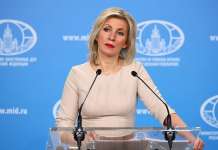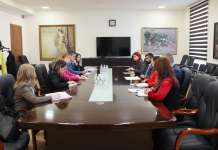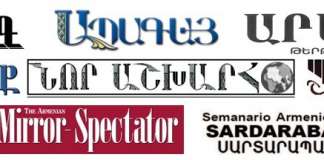Many people cannot locate the village of Panik in the Shirak Region of Armenia. It is a small community on the outskirts of Gyumri, where Russia’s 102nd military base is located. A seemingly insignificant incident brought to a head an uneasy situation that had been brewing for some time between Armenia and Russia.
The village of Panik almost overnight became a mini-Sarajevo with global ramifications.
On July 17, the nearby air base decided to hold unannounced military exercises, frightening the residents of villages in the vicinity. Although the commander of the base issued an apology to the population of the area, it seems that it was not enough for the government of Armenia, which raised the issue, with Prime Minister Nikol Pashinyan characterizing the incident as a violation of Armenia’s sovereignty, in a harsh statement.
Many observers were already suggesting that political tensions between Armenia and Russia were rising. Therefore, the Panik incident proved to be the straw that broke the camel’s back. It turned out that an insignificant event became the tip of the iceberg as the divide between Moscow and Armenia was widening.
The exercises were certainly designed to shock by Moscow.
Azerbaijan is not a strategic ally of Russia and it can freely associate with Europe, the US and even with Georgia, Moscow’s nemesis in the region, but Russia continues its normal relations with Baku.
But Russia will not tolerate deviance from the political script where Armenia is concerned. In plain terms, Moscow is defining Armenia’s role in the region, indirectly messaging that Yerevan must not expect any better treatment than its political clout allows, ally or no ally.
Armenia is in a strange bind as a member of the Collective Security Treaty Organization (CSTO) military alliance, two of whose members have close relations with its enemy; Armenia’s strategic allies Russia and Belarus have been supplying Azerbaijan with modern armaments and another ally, Kazakhstan, has a historic common cause with Baku as a Turkic nation. Thus, Armenia is ensnared in a cobweb of contradictions as a member of an organization that should make it supposedly feel secure.
Once Armenia began courting Europe, Moscow started to show its irritation. Although there has been no official pronouncement from Kremlin, sources close to the power centers have been extremely critical of Armenia’s move, despite assurances from Pashinyan that Armenia will continue to treat Russia as its strategic ally and that there will not be any sudden changes in its foreign policy. That approach leaves open the possibility that gradual changes may be in the offing. And Russia is already anticipating such changes, leading to increased unease towards Armenia.
A political analyst close to the Kremlin circles, Stanislav Tarassov, speaking with the news outlet Regnum, criticized Pashinyan’s reaction to the Panik incident as “unfriendly politics.” Many other articles have also appeared in the same vein in Lenta.ru, Gazeta.ru and other news outlets.
The Russian media criticism of Pashinyan has shifted from the Panik incident to his visit to NATO headquarters in Brussels. He has also been criticized for Armenia’s participation in the upcoming NATO military drills in Georgia.
At the same time, Russia had sent a delegation to Azerbaijan to participate in a forum titled “Azerbaijan is Russia’s only strategic ally in the Caucasus.”
As if that were not enough, the members of the delegation visited Lele Tepe, the piece of strategic territory which Azerbaijan took from Armenian forces during the surprise attack of April 2016.
One of the participants of the forum was a fanatical nationalist, Alexander Dugin, who gave an extensive interview to the First News outlet (Arachin Lratvakan) where he made revealing statements on Moscow’s anger over Armenia’s recent moves. He stated that Serzh Sargsyan had almost agreed to return to Azerbaijan five out of the seven regions under Armenian control and following the Velvet Revolution, that understanding does not seem to be valid any longer, adding, “Azerbaijan’s importance to Russia has been enhanced recently, and also Russian-Turkish relations have taken a positive turn.”
When asked why he visited the territory occupied recently by Azerbaijan from Armenia, Dugin answered that he considers Lele Tepe part of Azerbaijan and as a matter of fact, all of Karabakh is considered part of Azerbaijan by Moscow. He further encouraged the Armenian side to cede peacefully the five regions seized to Azerbaijan, which in return would yield some economic advantages, along with Baku’s good offices to improve relations between Armenia and Turkey and help lift the blockade.
Whatever Armenia agrees to give in terms of territory can only be taken by bloodshed and whatever the Turkish-Azeri side is willing to offer is easily reversible.
In fairness, Russian concerns are there for a reason. Armenia is not only giving subtle signals about its foreign policy shift, but some analysts close to Pashinyan’s administration have also been verbalizing that policy shift to make it audible to Moscow.
For instance, an analyst, Garnik Gevorgyan, writing in the First News outlet, made the following statement: “Russians understand that as a result of the Velvet Revolution, Armenia will move out of the Russian zone of influence gradually, not abruptly. …. And then there will come a time when Armenia will question the existence of Russian military presence on its soil, or at least will renegotiate the terms of stationing its forces there.”
Anticipating those developments, Moscow has signaled that a similar move will cost Armenia a painful outcome in dealing with the Karabakh conflict.
At this time, Moscow’s intention is to move the stalemate and implement the plan for Karabakh devised by Foreign Minister Sergei Lavrov. Unlike the Madrid formula, the Lavrov plan foresees the return of five regions to Azerbaijan and as a security guarantee, station peace keeping forces between two opposing forces and those forces will come from the Eurasian Union or CSTO, extending Russian military presence along the Iran in border.
As we can see, Armenia is caught in between the power play of world politics; the West, by enticing Armenia to its side intends to curtail Russian presence in the region, while Russia, using the Karabakh card, tries to even expand its influence in the Caucasus.
Armenians are excited that Europe and the West will enhance democratic rule and offer higher stands of living. The system in Russia and its immediate allies are fraught with incurable corruption. As long as Armenia remains captive in that zone of influence, democracy may not take root.
But on the other hand, Armenia’s place in the European or Western political system cannot be any better than the status of Greece in the NATO structure, where Greece is always the underdog, whenever European powers need to choose between the interests of Athens or Ankara.
Armenia’s road towards Europe is not covered with roses. Russia will not help Armenia in solving the Karabakh conflict but it will not also allow Armenia to move towards the West freely, compromising its military assets in the Caucasus.
The impending crisis began with military exercises in Panik but as we can see, it is growing into a panic of global magnitude.















